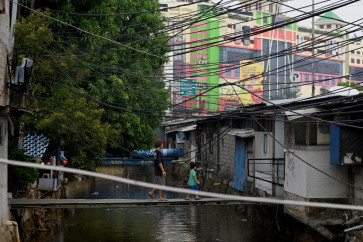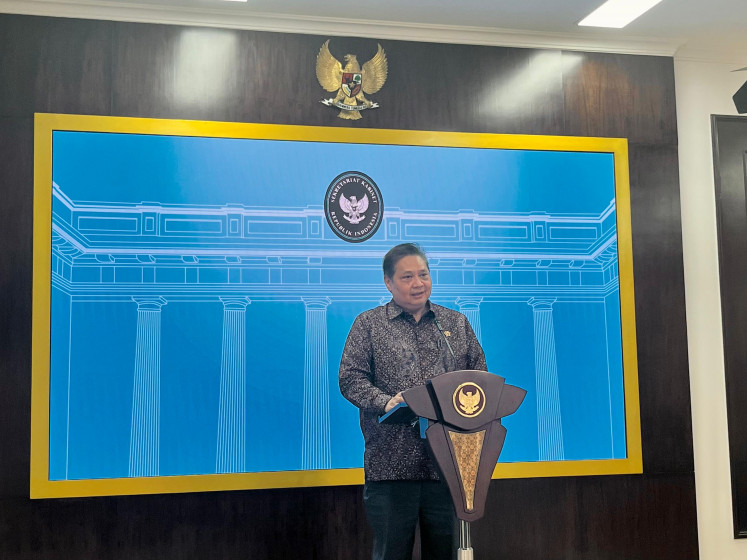Workers to hold mass rallies despite pandemic
Millions of workers across the country are planning to break social-distancing rules and stage nationwide rallies on April 30 to press lawmakers to suspend deliberation of the controversial omnibus bill on job creation
Change text size
Gift Premium Articles
to Anyone

M
illions of workers across the country are planning to break social-distancing rules and stage nationwide rallies on April 30 to press lawmakers to suspend deliberation of the controversial omnibus bill on job creation.
The workers, facing mass layoffs because of the COVID-19 outbreak, say they will risk contracting the deadly virus to stop the House of Representatives passing the bill, which they believe is designed to trample labor rights.
A number of labor unions, including the Inter-Factory Laborers Federation (FBLP) and an alliance of the country’s three biggest groups the Workers Union Confederation (KSPI), the All-Indonesia Workers Union Confederation (KSPSI) and the Indonesia Welfare Labor Confederation (KSBSI), said they would rally in front the House complex in Jakarta and the offices of legislative councils across the country.
“The option is either to die from the coronavirus for joining a rally or die of starvation from having nothing to eat,” FBLP chairwoman Jumisih said on Monday.
Rallies at the House complex were initially planned by the big-three unions for the end of March. The workers, however, dropped the plan after being informed that many lawmakers, including House Speaker Puan Maharani of the ruling Indonesian Democratic Party of Struggle (PDI-P) questioned the need to rush the process.
Much to the unions’ surprise, lawmakers moved to proceed with the bill’s deliberation, a decision announced by Deputy House Speaker Azis Syamsuddin, a Golkar Party lawmaker, during a House plenary session earlier this month. Azis claimed President Joko “Jokowi” Widodo himself gave the green light for the deliberations.
“We urge lawmakers to stop the deliberation [process]. President Jokowi must immediately withdraw the bill from the House,” said KSPSI chairman Andi Ghani Nuwa Wea. “Our members nationwide are getting ready to rally, and I can assure you that they are prepared to die.”
The insistence by politicians from the ruling coalition on continuing the talks in private has raised concerns about the motivation behind the omnibus bill.
Lawmakers and officials have argued that the bill is required to boost investment, but labor unions believe that the hasty political horse-trading occurring behind the curtain of physical distancing serves a single purpose: to provide companies with a way out of honoring their responsibilities to their workers.
The leaders of several progressive labor unions, including the FBLP, KSPSI and the Congress Alliance of Indonesian Labor Unions (KASBI) said that both officials and lawmakers were using the COVID-19 crisis to “legitimize the exploitation of workers”.
“While we are hard at work pushing firms to hand over severance pay to workers already laid off, the government and lawmakers are working fast to pass a bill that allows them to easily lay off even more people,” said KASBI chair Nining Elitos.
According to Manpower Ministry data, more than 1 million workers have been laid off or furloughed since the COVID-19 outbreak took hold in the country. An estimated 5.2 million more workers could still lose their jobs.
The bill has been criticized for its pro-business bent, which opponents have claimed will make it harder for workers to negotiate on an equal footing. “It promotes the spirit of individualism by restricting the role of unions in negotiations. It involves pitting [individual] workers against entire companies, so how can you expect a fair fight?” Jumisih said.
Responding to the mounting protests, leaders of the House Legislation Body (Baleg) tasked with negotiating the bill have pledged to remain transparent and accountable, with promises to broadcast all the meetings publicly on the legislature’s television channel and on its social media accounts.
“We also promise to invite the unions to participate in the meetings, whether virtually or face-to-face,” said Baleg chairman Supratman Andi Atgas of the Gerindra Party.
However, backroom talks remain unsupervised.
Baleg kicked off the bill’s virtual deliberation process on April 7, having made only the last few minutes of the meeting accessible to the public. Another meeting on April 14 was broadcast for the first 30 minutes before it was switched with a parallel program led by Golkar’s Azis detailing solutions that firms have come up with.









